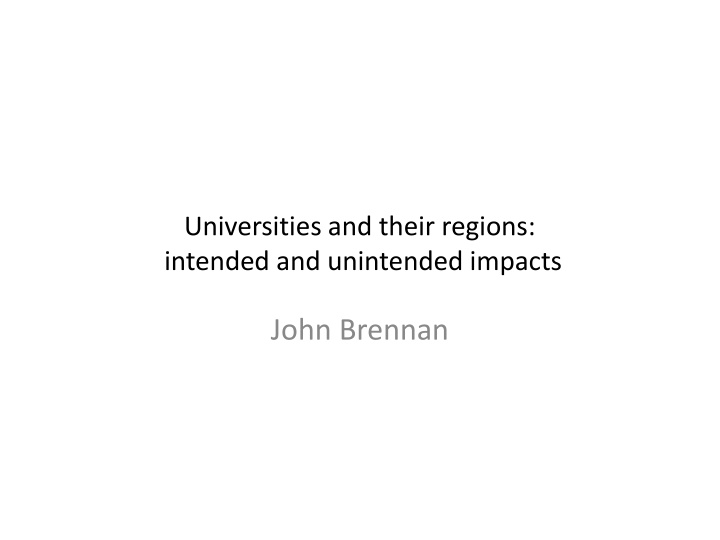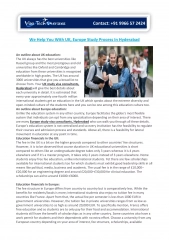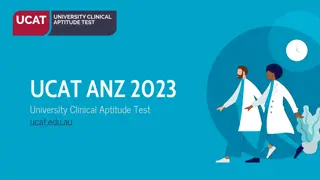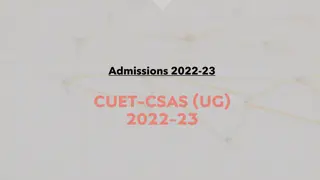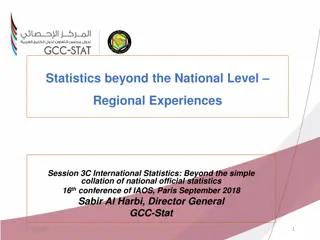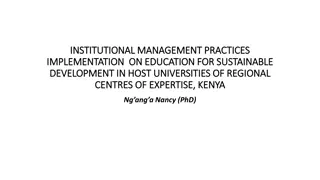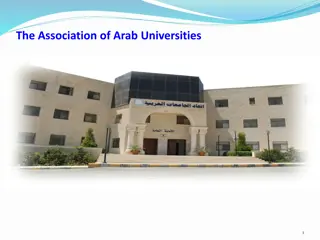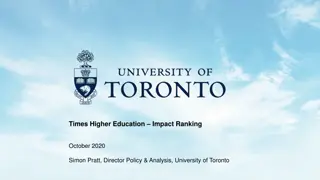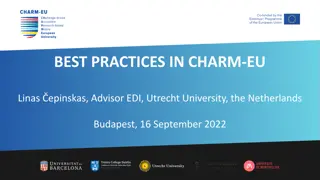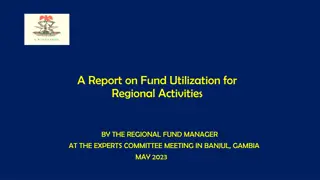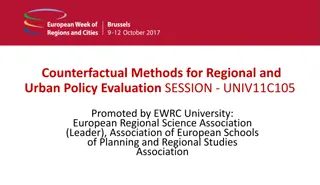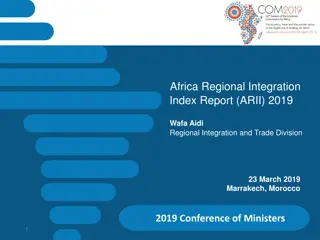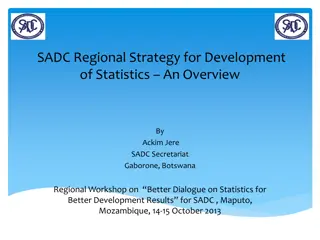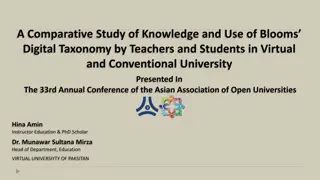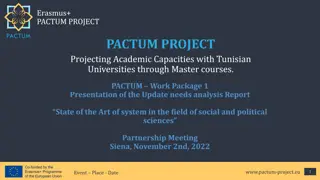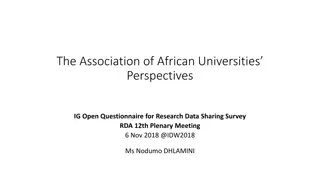Impacts of Universities on Regional Development
Universities play a crucial role in regional development, with intended and unintended impacts discussed in various projects and perspectives. Smart specialisation strategies can drive economic advancement in regions by focusing on well-defined domains for specialisation. Challenges like stakeholder interests and sustainability need to be addressed for successful implementation.
Uploaded on Mar 13, 2025 | 1 Views
Download Presentation

Please find below an Image/Link to download the presentation.
The content on the website is provided AS IS for your information and personal use only. It may not be sold, licensed, or shared on other websites without obtaining consent from the author.If you encounter any issues during the download, it is possible that the publisher has removed the file from their server.
You are allowed to download the files provided on this website for personal or commercial use, subject to the condition that they are used lawfully. All files are the property of their respective owners.
The content on the website is provided AS IS for your information and personal use only. It may not be sold, licensed, or shared on other websites without obtaining consent from the author.
E N D
Presentation Transcript
Universities and their regions: intended and unintended impacts John Brennan
2 projects and 2 perspectives 1. The role of universities and research organisations as drivers for smart specialisation at regional level (EC project, 2013) 2. Higher education and regional transformation: social and cultural perspectives (ESRC project, 2010-12)
Smart specialisation the discovery of well-defined domains for specialisation in a region or country in which it could excel and have comparative advantages, may trigger economic advancement in that region or country Place-blind or place based innovation strategies? The formation of regional hubs where good science, technology, talent and entrepreneurship may cluster and have a significant socio-economic regional impact
Related international initiatives Regions of Potential (REGPOT) Regions of Knowledge Innovation Union Flagship Initiative The Higher Education Modernisation agenda Digital Agenda for Europe European Drivers for a Regional Innovation Platform Connecting Universities to Regional Growth
Smart specialisation - a definition a strategic approach to economic development through targeted support to Research and Innovation (R&I). More generally, smart specialisation involved a process of developing a vision, identifying competitive advantage, setting strategic priorities and making use of smart policies to maximise the knowledge-based development potential of any region, strong or weak, high-tech or low-tech. (Joint Research Centre, 2012)
Smart Specialisation some challenges to recognise that different stakeholders may have different interests and objectives to address communication gaps between them to identify and engage the right kinds of expertise that different stakeholders could bring to the different elements and stages of the smart specialisation process to address from the outset of the process the challenge of achieving sustainability for successful innovations
Smart specialisation - more challenges to recognise and avoid compromising the other important functions of higher education institutions and research organisations which may not be relevant to smart specialisation to recognise and exploit the differentiation and diversity of higher education institutions and research organisations: different kinds of expertise may be found in different places to recognise that the knowledge base for a local smart specialisation initiative is located within a wider knowledge context (in order to maximise the competitive advantage from the resulting activity)
Types of innovation Scientific innovation research generated (may be demand driven, supply driven or policy driven) Empirical innovation based on intuition and practical experience ( generally focused and specific) Social innovation originating from social needs and experiences ( indirect economic benefits by reducing social problems)
An example As part of the universities 3 year performance contracts the ministry has invited Austrian universities to position themselves in their region with the help of a location concept in order to integrate their regional role into an internationalisation strategy for research. With the help of the location concept the university is able to highlight its position within a critical network of excellence with strategic partners in industry, business and academia in a self-selected area of close collaboration and will also be able to attract private and public funding including EU cohesion funding.
Smart Specialisation - an opportunity Smart specialisation requires the universities to rethink their role in regional innovation beyond a source of scientific research and development capacity and offers an ability to mobilise expertise in other policy-relevant knowledge domains, such as economics, business and regional development (involving) rejuvenating traditional sectors through higher value-added activities and new market niches, modernising regional economies by adopting and disseminating new technologies, diversifying technologically from existing specialisations from related fields, and exploiting new forms of innovation such as open and user-led innovation, social innovation and service innovation. (EC, 2011, Factsheet on Research and Innovation Strategies for Smart Specialisation)
Smart Specialisation - in conclusion An economic focus Science and technology as drivers Emphasis on research role of universities Within a knowledge economy framework Leading role for universities Regionalism within a global context Obtaining competitive advantage
Other impacts From intended to unintended From policy to practice From economic to social and cultural From research to teaching, research, knowledge exchange etc etc
The HEART project Higher Education and Regional Transformation 4 case studies of universities in their regions 3 in England and 1 in Scotland Social and cultural perspectives Links to the economic Regional diversity Higher education diversity Stakeholder perspectives
The HEART case studies Glocal University in Northville Aspirational University in Eastside Transformational University in Rivertown Regenerational University in Metrocity East
HEART Project: Methods Review of institutional web-sites and public documents Interviews with institutional leaders Interviews with staff in selected departments Interviews with local stakeholders residents, businesses, schools, politicians etc A survey of residents (in one case study)
Defining region Administrative definitions (north-east England, Yorkshire) Geographical definitions (the west country ) The towns of an area City regions The streets around the university Most universities are part of all of these. But places are different.
Regions are different 1. geographical location 2. degree of isolation (communications) 3. clarity of boundaries (defining the region) 4. economic profile 5. social and ethnic mix 6. extent of mobility (inward/outward) 7. extent of population loyalty/identity 8. Image/confidence 9. stability/change 10.extent of diversities (social, economic & cultural)
Universities are different 1. who their students are 2. where they come from 3. why they come 4. what they experience 5. where they go to afterwards 6. the university embeddedness in the region (history and other contextual factors) 7. the balance between teaching & research and the regional relevance/focus of both 8. rewards and incentives for staff 9. extent and nature of partnerships 10.extent and nature of institutional change
Universities and their regions Universities influence what is possible within regions Regions influence what is possible within universities
Connecting the social/cultural and the economic features of regions Economic developments can increase opportunities for social mobility Aspirations may also be affected Cultural attractiveness may attract inward investment Cultural diversity may or may not have economic implications but can be influenced by HE (inflows and outflows of students and staff)
Importance of the cultural in its own right Cohesion or segmentation/fragmentation/conflict: what role does HE play? Notions of active citizenship may have an impact: student volunteering, staff on school governing boards Related notions of university as good neighbour : including public roles of senior university staff Notions of image and attractiveness and confidence of a region
HEART project: key findings a) universities and economic development/regeneration Universities important as nodes in the transmission of globalised competitive agendas (e.g. knowledge economy, digitisation, creativity) A role in the up-skilling and re-skilling of local workforces (but not just in region) Impacts of universities as businesses in their own right e.g. property interests and employment strategies University business strategies driven by own priorities, but can t ignore local/regional development priorities Unintended consequences of universities may be as important as planned and intended ones (e.g. studentification, bohemianisation, service activities, property development)
Heart project: key findings b) regional and university images, local and institutional cultures Images may be enhancing or constraining Universities can have a strategic impact through partnership/development opportunities with other agencies Universities have a physical impact on their immediate environment (e.g. car parking!) Universities involvement in cultural ventures (both high and popular culture) through students is impact rich Universities direct involvement in cultural innovation and attitude change is impact poor
HEART project: key findings c) Aspirations and opportunities for personal change and social mobility Discourses of widening participation and raising aspirations justify local engagement activities by universities But the extent and form of engagement varies considerably (reflecting reputational factors) Aspirations of local people may not match those valued by government and universities Universities regarded as creaming off the most able local students providing exit strategies from region Some social mobility, but much class reproduction and status confirmation
HEART Project: key findings d) Forms and discourses of public and community engagement Universities can help provide leadership and co-ordination roles in community development and regeneration strategies. Rhetoric and instrumentalism in regional relationships a feature of globally-oriented universities. More locally entangled universities often fail to achieve a convincing holistic rhetoric. Opportunity universities may emphasise a mixture of employability, community support, civic engagement, social mobility, active citizenship etc Transformational universities emphasise cultural regeneration (raising aspirations, entrepreneurial culture)
HEART Project: Key findings e) The role of universities in tackling social inequalities University widening participation activities provide social mobility opportunities for the few without altering patterns of inequality for the many. A social stratification of universities within a region may map onto and reinforce wider patterns of inequality. A university may bring advantages to all within a region by its contribution to economic development and local employment The university role in tackling inequalities and disadvantage may be long-term and inter-generational. It needs to broaden notions of access beyond course enrolments to include knowledge, facilities and relationships.
Heart Project: some questions Effects of policies (whose policies?) Effects of contexts (economic, social, geographical, educational) Short- and long-term perspectives Winners and losers Regional transformation and university transformation? Collaboration v competition Autonomous v responsive relationships Structural and human resource implications
References C.Fotakis, M.Rosenmoller, J. Brennan, L Matei, R.Nikolov, C. Petiot, J Puukka, 2014, The role of universities and research organisations as drivers of Smart Specialisation at regional level, European Commission, DG Research and Innovation, Brussels A.Cochrane, 2012, Putting Higher Education in its Place: the socio-political geographies of English universities, Policy Press J.Brennan, A.Cochrane, Y. Lebeau, R.Williams (forthcoming) The University in its Place: social and cultural perspectives on the university s regional role, Dortrecht:Springer
